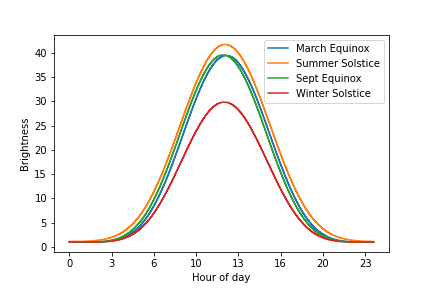daylight or libdaylight is a library which enables you to answer daylight related questions like:
- Irradiance - How bright is it outside, given a particular time and location?
- What is the time of sunrise/solarnoon/sunset, given a particular time and location?
libdaylight is written in modern C++ with bindings to python using pybind11.
daylight's python bindings provide vectorized functions - allowing for efficient analysis when dealing with lots of queries. At the same, this allows daylight to play well with established data science tooling like numpy and pandas.
The math used in this library is mostly based on NOAA's solar calculations, which were in turn based on Astronomical Algorithms, by Jean Meeus. Also thanks to this Python implementation of these calculations by Michel Landers, which was a very useful reference while building this library.
From PyPI
$ pip install daylight$ pip install git+https://github.com/adonmo/daylightNote: This requires cmake and pybind11 to be installed on your system. If you're having trouble with pybind11, try using a conda enviroment instead.
The examples directory contains a real world usage of this library at Adonmo - for its season and location independent brightness control mechanism: Click here to read it.
import datetime
import pytz
import daylight
def epoch(year, month, day, hour=0, minute=0, second=0, tz=pytz.UTC):
return int(tz.localize(datetime.datetime(year, month, day, hour, minute, second)).timestamp())
tz = pytz.timezone("Asia/Kolkata")
tz_offset = tz.utcoffset(datetime.datetime.utcnow()).total_seconds() / 3600
# Example with GPS coords for Hyderabad, India, in Indian timezone (IST)
sun = daylight.Sunclock(17.3859, 78.4867, tz_offset)
# Know the daylight strength / ambient brightness level at a given time of day
# Below call returns 0.882753920406182
sun.irradiance(epoch(2020, 5, 21, 14, 10, 35, tz))
# Know the sunrise time for a given date
# Returns unix timestamp for 5:42 AM
sun.sunrise(epoch(2020, 5, 21, tz=tz))
# Know the solar noon time for a given date
# Returns unix timestamp for 12:12 PM
sun.solar_noon(epoch(2020, 5, 21, tz=tz))
# Know the sunset time for a given date
# Returns unix timestamp for 18:42 PM
sun.sunset(epoch(2020, 5, 21, tz=tz))
# daylight's functions are vectorized as well - which means you can compute results
# for multiple parameters efficiently, while playing well with libraries like numpy/pandas
# Returns [-0.56570521 0.28650605]
sun.irradiance([
epoch(2020, 5, 21, 3, 0, 0, tz),
epoch(2020, 5, 21, 7, 0, 0, tz),
])Python API Reference and comparision with other libraries can be found on our docs: https://adonmo-daylight.readthedocs.io/en/latest/
libdaylight can also be used in C through the provided C API.
Here is an example code on how to do this:
#include "daylight_c.h"
#include <stdio.h>
int main(int argc, char* argv[]) {
struct Sunclock* s = newSunclock(17.3859, 78.4867, 5.5);
time_t t_20200521141035 = 1590050435;
double irradiance = Sunclock_irradiance(s, t_20200521141035);
printf("%lf\n", irradiance);
deleteSunclock(s);
}Save the above file as main.c, and run the following commands to build and run it:
Note: Make sure daylight is built first before running these commands.
$ gcc -I/<path_to_daylight>/capi -c main.c -o main.o
$ g++ -L/<path_to_daylight>/build/capi main.o -l:libdaylight_c-0.1.1.so -o main
$ LD_LIBRARY_PATH=/<path_to_daylight>/build/capi ./main
0.882754Python: https://adonmo-daylight.readthedocs.io/en/latest/reference.html
C++: https://adonmo.github.io/daylight/
libdaylight uses the CMake build system.
$ cmake -B build -S .
$ cmake --build buildThis builds a static library file libdaylight.a
If you make any additional changes, you can just run cmake --build build again to get your changes reflected in the compiled outputs.
$ cmake -B build/test -S test
$ cmake --build build/test
$ ./build/test/libdaylight-testsIf everything is working okay, you should see "All tests passed".
libdaylight uses the Catch2 library for its tests.
There are no strict tests yet for the python bindings. However you can run an example script file, making this a sanity test at least.
After building, from the tests/python directory, run:
$ python test.pyIf everything is working okay, you should see "All tests passed".
$ pip install sphinx sphinx_rtd_theme numpy numpydoc
$ cmake -B build/docs -S documentation
$ cmake --build build/docs
$ cmake --build build/docs --target pydocsYou can then proceed to host the docs locally, for example on https://0.0.0.0:8000/
$ python -m http.server --directory documentation/python/_build/html$ cmake -B build/docs -S documentation
$ cmake --build build/docs
$ cmake --build build/docs --target cppdocsYou can then proceed to host the docs locally, for example on https://0.0.0.0:8000/
$ python -m http.server --directory build/docs/doxygen/htmlIssues and pull requests are welcome.
- For proposing new features/improvements or reporting bugs, create an issue.
- Check open issues for viewing existing ideas, verify if it is already proposed/being worked upon.
- When implementing new features make sure to add relavant tests and documentation before sending pull requests.
PyEphem, pvlib-python and solarpy are some libraries which have overlap with the type of problems this library solves.
Comparision between them and this library can be read on our docs

